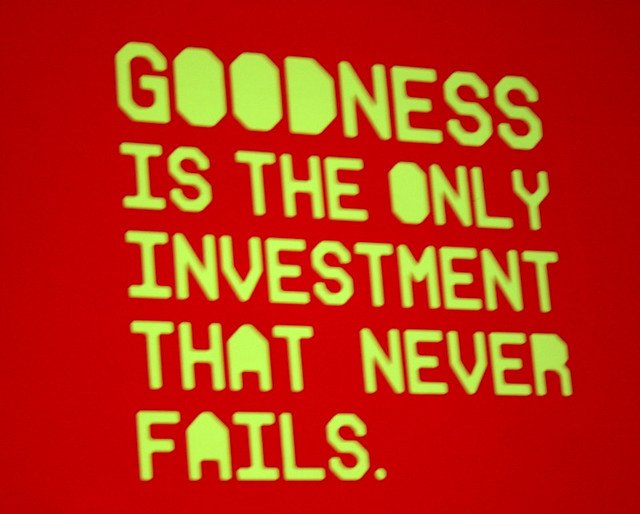Goodness isn’t simply a genetically composed, hereditary feature like a crooked nose or big blues. Goodness, though definitely in part influenced by nature and nurture, is an individual’s own decision. Goodness is a pursuit. This pursuit can’t take place without the desire to pursue it. For with the foundation of a moral standard, guilt in wrong doing, tools such as love and kindness, and effort and practice, one can achieve goodness.
The pursuit of goodness, much like the pursuit of happiness or success, is a continual journey that thrives on effort and practice. The characteristics of kindness, humility, etc. are merely tools, either innately gifted or acquired along the path, that assist us on this pursuit. And despite the amount of tools one might possess, goodness is dictated by how one might wield them. As Immanuel Kant had stated “…these gifts of nature may also become extremely bad and mischievous if the will which is to make use of them.” But goodness isn’t as simply defined as the action of goodness. Jean-Paul Sartre had stated “a man is nothing else than a series of undertakings.” And even though to others, someone is defined by the series of their actions they had witnessed, a person’s goodness isn’t defined by other’s perceptions. Goodness transcends physical action and evidence of undertakings, but the internal thoughts and motivations behind said actions and doings. Recognizing goodness requires an honest, real dissection of one’s soul or mental thought processes. And due to that, the only person that can truly measure a person’s own goodness is themselves.
In order for one to truly commit a good act, one must have pure intention behind it. But in order to achieve pure intention, one must achieve a pure mind. In many ways, one must alter the, as writer David Foster Wallace once put, “the default setting.” This is the inherent consciousness or system of thought downloaded in our minds upon birth. This setting, which installs a sense of morality and love, also installs the natural draw to selfishness. From a biological standpoint alone, it is scientifically beneficial to be self-centered. Therefore the common qualities associated with goodness, the main in which being selflessness from which stems kindness and charity, contrasts the biological, “default setting” of the human mind. Therefore, goodness is a consistent counteraction against human tendency. It takes dedication and a conscious effort to remain aware of the pursuit. It is so easy to fall back into the selfish subconscious and go about your days solely to accomplish your own tasks. Goodness is the allowance of being interrupted; the allowance of intertwining with other people’s life’s paths and perhaps taking part or assisting them along their journeys. From this intertwining of paths and the selflessness of diverging from your own, relationships and the concept of love is derived. And love is perhaps the greatest motivation and tool that combats the selfish subconscious and assists us along the pursuit of goodness.
No matter how innately good one might be, all people experience hardship that can easily harden one’s heart. All people pursue one form of success that might spark a worship of power or worship of self in order to achieve said dream. Goodness is sprung from the constant combat against resentment and hardening; constant resistance of inherent selfishness; the constant regard for others; and perhaps even the constant awareness of ephemeral life. And if goodness takes, in a great part, effort, than we can state that a component of goodwill is strong will.

Congratulations @steemwriter! You have received a personal award!
Click on the badge to view your own Board of Honor on SteemitBoard.
For more information about this award, click here